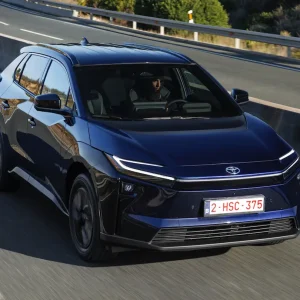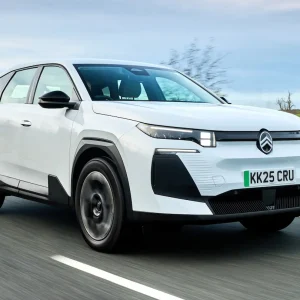Volkswagen Commercial Vehicles (VWCV) has conducted a six-month trial of augmented reality headsets, capable of transmitting a technician’s field of vision to a fleet operator’s desktop or mobile device.
The headsets comprise a miniature Android computer and a micro-display system – said to create a virtual 7in screen in front of the individual – and are worn
by technicians at franchised dealerships and field-based staff operating mobile service vehicles.
The idea behind the technology is to speed up the service and repair process, and reduce downtime. Users can dial-in remote help for complex procedures from Volkswagen’s technical centre at Milton Keynes or from sister sites within a dealer group, while mobile staff can call their base and consult colleagues. The recipient is able to see and hear precisely what the technician – who still has both hands free – does, so they can point, touch and even use the system to virtually highlight specific areas of the vehicle.
“What it enables us to do is effectively be in the van centres,” said Paul Anderson, service operations manager at VWCV.
“Sometimes, the technicians need a hand, and the technical centre can only really do so much when you can’t see what’s going on. When there’s a call going on, you can see what they can see, they can see you on the screen, you can put images in front of them, you can be talking about a component or something and say, ‘I’m talking about this area here’ and draw circles round it and things like that. That’s the difference.”
The headsets are manufactured by Realwear, which supplies them to numerous industries, including the construction sector. As well as the digital element, they are designed to cope with the kinds of environments in which technicians typically work.
“They’ll stay on your head, and they’re pretty rough and ready,” added Anderson.
“Also, workshops can be quite noisy environments, so they have a noise cancellation system – a sort of second microphone – that blanks out all of that so you, the technician, can hear what the other party is saying, and you’re not getting too much feedback from the workshop at our end.”
In addition to serving as an efficiency measure, the headsets also allow technicians to visually communicate with owners and operators, regardless of where either party is based.
John McNally, service director at retail group Cordwallis, which operates commercial vehicle dealerships in the south-east, has trialled two headsets: “We deal with quite a few big fleet customers, and what you find is that a lot of the fleet managers are never on-site, so we Skype call them from the headset. We say ‘you’ve asked us to look at this; this is what we’ve found’. Even though we use video vehicle health checks on all the vehicles anyway, you only see one end of the story, whereas with the Skype call, the customer is interacting with the technician and saying ‘right, I can see what you’re saying now’.
“By having that conversation, explaining the situation and showing them, it creates a lot of transparency and trust with the customers, and we can say ‘as you can see, Mr Customer, this is it’.”
He added that the sound quality was clear enough for experienced technicians to remotely diagnose faults by listening to noises via the feed. “You can literally put your head under the bonnet and say ‘listen to this noise here: I’m not sure where it’s coming from; have you ever heard this before?'”
The manufacturer began trialling the headsets with a number of its dealers in January and was in the final stages as BusinessCar went to press, with plans to later roll them out across the rest of the network. It will be at the discretion of individual retailers as to whether or not they adopt the technology and they will be required to invest in it themselves.
VWCV did not disclose the cost of the headsets, but the entry-level product, known as HMT-1, is advertised at $2,000 (circa £1,500) on Realwear’s website, while a more advanced version, dubbed HMT-1Z1, costs $5,000 (circa £3,800).
The company also suggested that the technology could be used to remotely train technicians and as a showcasing tool, to guide customers through specific products or features.





